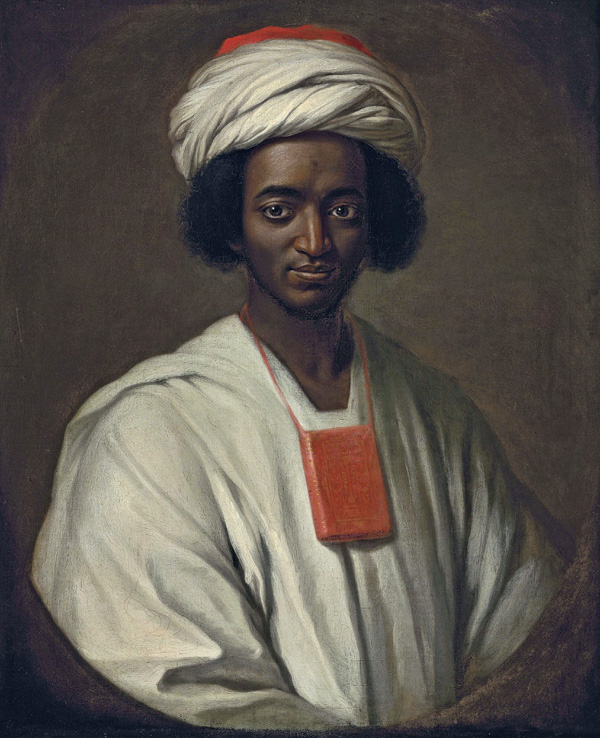Thomas Bluett
ca. 1690 - 1749
Some Memoirs of the Life of Job
Portrait of Ayuba Suleiman Diallo
|
|
|
______________________________________________________________________________
|
|
|
The portrait of Ayuba Suleiman Diallo with a copy of the Coran was painted in 1733 by William Hoare of Bath.
Ayuba Suleiman Diallo (1701-1773), also known as Job ben Solomon, was a famous enslaved Muslim who was a victim of the Atlantic slave trade. Born in Bondu, Senegal West Africa, Diallo came from a prominent Fulbe family of Muslim religious leaders. His grandfather had founded the town of Bondu, and he grew up with Samba Geladio Diegui the heir (kamalenku) to the Kingdom of Futa-Toro. In 1730, Ayuba became a victim of the ever-growing slave exploitation of the Senegambia region. Ayuba and his interpreter Loumein Yoas were near the Gambia River to trade slaves and paper. While visiting some friends on their return trip, Ayuba and Yoas were captured by invading Mandingoes. The two men were sold to factors of the Royal African Company. Ayuba subsequently convinced English Captain Pike of his high social status, and explained his father was capable of paying ransom. Pike granted Ayuba leave to find someone to send word to Ayuba's family. Since the messenger did not return in time, at the behest of Captain Henry Hunt, Pike's superior, Ayuba and Loumein were sent across the Atlantic to Annapolis, Maryland. Ayuba was initially put to work in the tobacco fields; however, after being found unsuitable for such work, he was placed in charge of the cattle. Ayuba ran away and was captured and imprisoned at the Kent County Courthouse. It was there that he was discovered by a lawyer, Thomas Bluett, traveling through on business. The lawyer was impressed by Ayuba's ability to write in Arabic. Bluett and Ayuba traveled to England in 1733. There Ayuba was in the company of many prominent people, including the royal family and the Duke and Duchess of Montague. In July 1734, Ayuba returned to Gambia and later returned to his homeland. His father had died, and one of his wives, presuming that Ayuba had perished, had remarried. His homeland was ravaged by war, but being a prosperous individual, he was able to regain his old lifestyle. However, he faced later hardships. In June 1736, he was imprisoned or held as a parolee by the French. Ayuba may have been targeted by the French because of his alliances with the British. He was held perhaps for a year by the French, when Ayuba's local countrymen, rather than the British, secured his release. His death was recorded in the minutes of the Spalding Gentleman's Society in 1773. (Wikipedia) |
